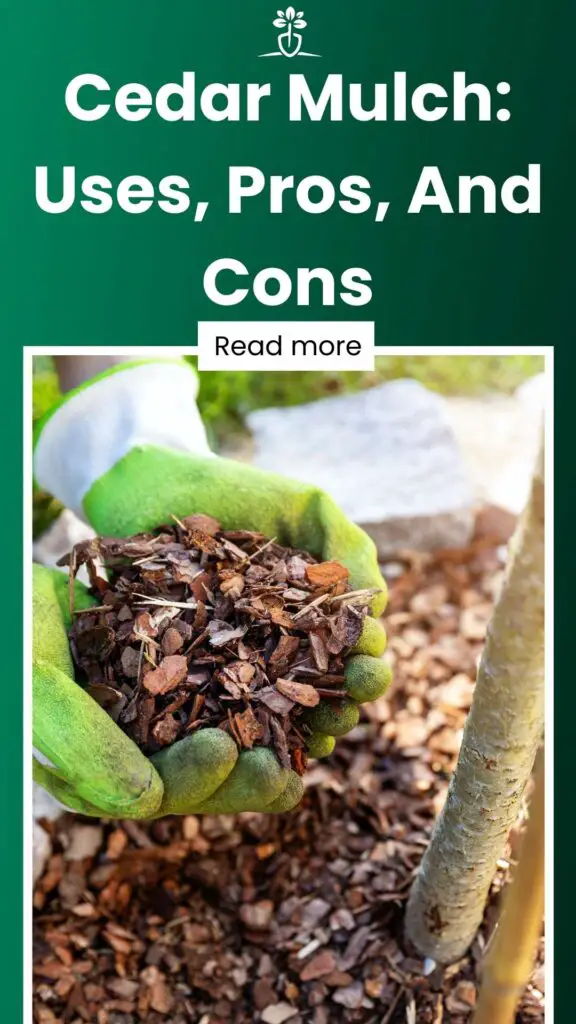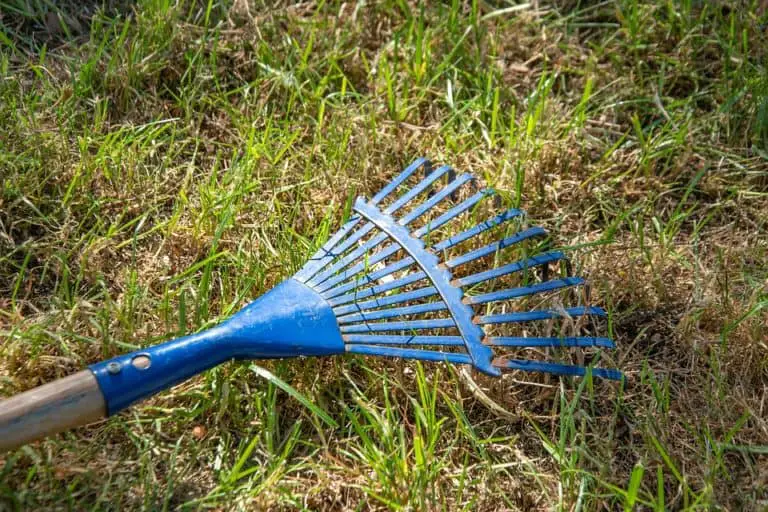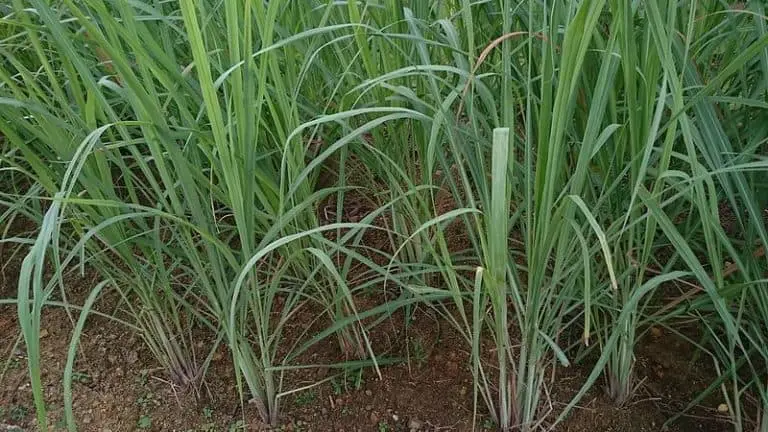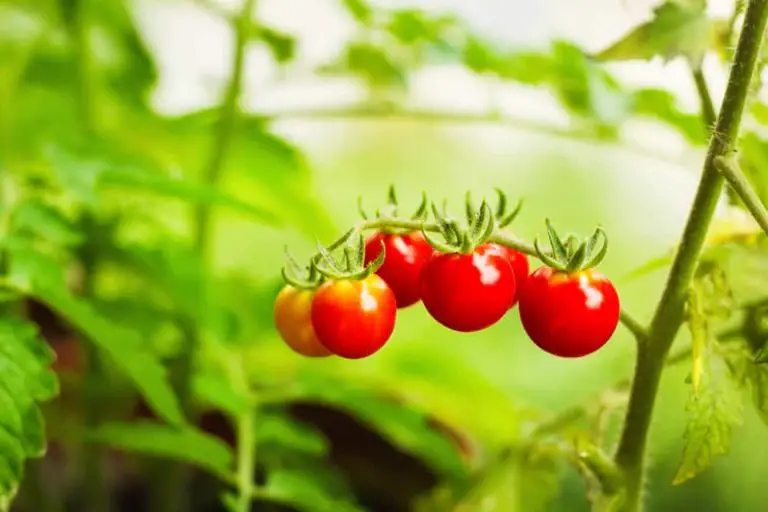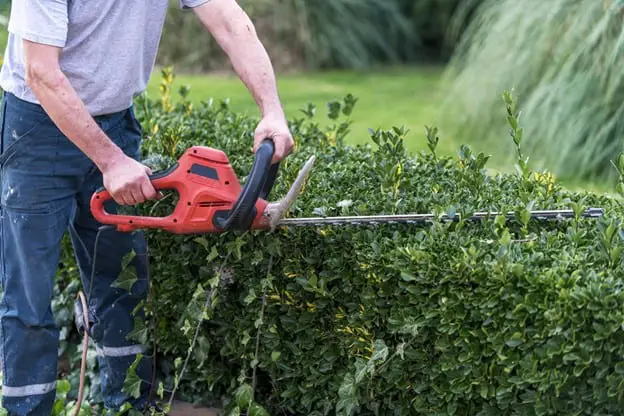Cedar Mulch: Uses, Pros, And Cons
Gardens become enchanting spaces with cedar mulch because it holds water and feels nice and warm, like a cozy blanket. Yet, there are moments when it might not be the top pick.
In this article, we delve deep into this special mulch, discussing its characteristics, uses in the garden and potential disadvantages.
Made from the bark clippings and shavings of the majestic cedar tree, cedar mulch adds more than just aesthetic appeal to gardens. It helps in moisture retention, soil insulation, improving soil quality and prevents pest infestation. Despite its many uses, this mulch comes with its own set of drawbacks.
Contents
What Is It And What Does It Add To Your Garden?
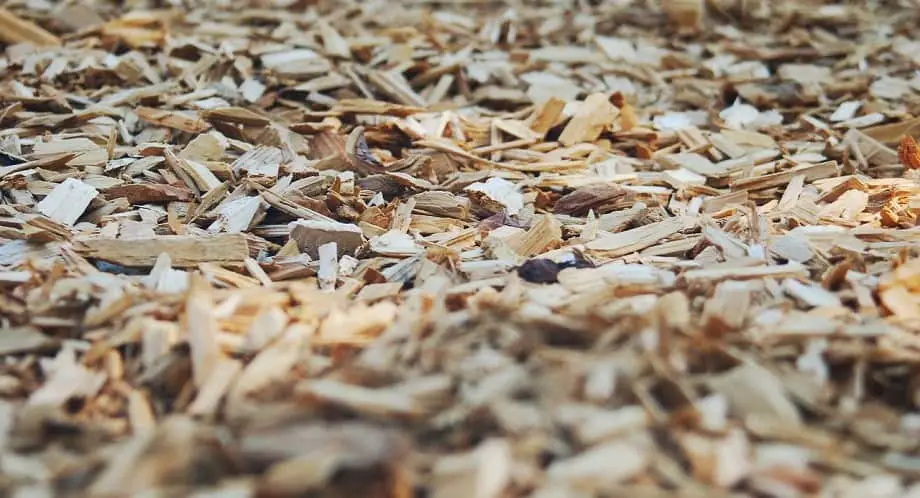
Cedar mulch is what is left after the wood has been taken from cedar trees. In other words, when cedar trees are chopped to obtain wood, the chipped and shredded byproduct is the mulch.
A lot of gardeners love using cedar mulch for its gorgeous reddish-brown color and distinct aroma. However, it is dyed in a variety of colors which adds to the decorative value of the garden. Apart from that, cedar mulch has tremendous benefits like insulating soil and retaining its moisture, as well as repelling pests.
Choosing Between Natural Or Dyed Cedar Mulch
While cedar mulch is a naturally beautiful reddish-brown color, it tends to lose vividness rather fast. This is the reason why a lot of people are inclined towards buying artificially dyed mulch in various eye-catching colors like red, brown, black and yellow.
We would not recommend dyed mulch for your garden for the simple reason that it uses chemicals that could ultimately become a part of the soil and food that you eat (if you plant your vegetables and fruits). Plus, it is not environmentally friendly.
You can, however, go for cedar mulch dyed using natural pigments, but that is extremely expensive. Thus, not a very viable option.
How Does Mulching Benefit Your Garden?
Before we get to the detailed uses of cedar mulch, it is crucial to understand what exactly mulching is and how it benefits your garden.
Mulch is usually, but not exclusively, an organic substance that acts as a cover for the topsoil layer to help provide a better growing environment for plants in the garden.
If your garden soil isn’t protected through mulching, natural phenomena like wind, rain and climatic changes result in the soil losing important nutrients which help plants grow. Without the protective mulch cover, your soil won’t be fertile enough for optimal plant growth.
According to the United States Department of Agriculture, mulching protects against soil erosion, increases water infiltration and propagates root growth.
Following are a few of the many reasons why mulch is an excellent gardening resource.
- In hot and dry climates, mulching vegetable garden beds and overall garden soil will help maintain moisture.
- Mulching creates an insulation cover that protects the soil from wind and lower temperatures. The mulch barrier helps the soil to remain warmer, which is safer for roots. In this way, the heat produced from the microorganisms working the soil does not escape into the atmosphere. This especially helps in winter with plants that have poor cold tolerance.
- Weeds do not grow well without light. The mulch “blanket” cuts off light, efficiently controlling unwanted weeds in the garden.
- Since mulch is essentially a cover, it works well to retain topsoil nutrients.
- Potentially, mulching can also fight against pests that commonly plague gardens.
Cedar Mulch: Uses
- Soil Moisture Retention
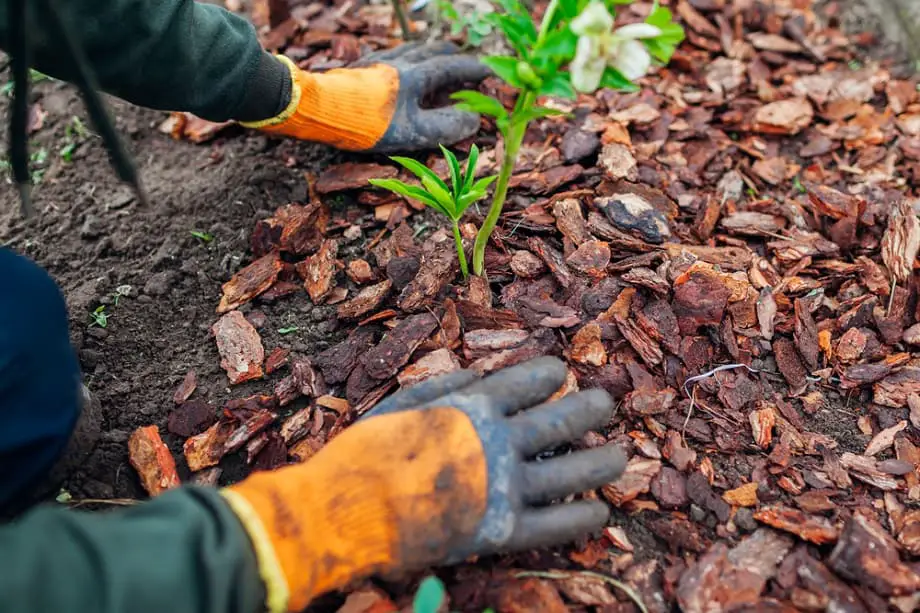
We have already touched on how cedar mulch can be beneficial for your garden. In this section, let’s discuss cedar mulch uses in detail.
The primary use of cedar mulch is to retain moisture in the soil. Cedar mulch does an excellent job of becoming a barrier between the soil and the environment. This helps the soil in several ways:
- Less watering is needed since the cedar mulch cover prevents excessive evaporation.
- It helps in soil temperature regulation, which again helps in water retention.
- It protects the topsoil from wind, which once again helps excessive moisture from leaving your garden soil.
Overall, mulching prevents the soil from drying out and helps plants survive better with less irrigation. This not only aids in easy plant maintenance, but also helps in water preservation – a win, win.
- Helps Control Weeds
Another use of cedar mulch is protection from pestering weeds.
Cedar mulch acts as an effective weed repellent in two ways: first, it acts as a cover for the soil, inhibiting weeds from reaching the surface, and secondly, it maintains a barrier that does not let enough sunlight through for weeds to germinate.
Since plants do not have to compete with weeds for nutrients, they grow better, resulting in a fuller, healthier garden.
- Protects Against Pests
Cedar mulch is an excellent natural pest repellent. Cedar wood’s natural oils provide effective protection against pests such as termites, various ant species and cockroaches.
As discussed earlier, we cannot help but mention cedar mulch’s use in beautifying gardens.
For these reasons, cedar mulch, even though not without its drawbacks, is the preferred choice for many recreational gardeners.
How And When To Use Cedar Mulch
Now that we know the most beneficial uses of cedar mulch, it is just as essential to understand when to use it and when you would be better off opting for a different type of mulch.
One of the safest uses for this type of mulch is in pathways where regeneration of soil isn’t necessary.
Despite its established benefits, some people advise against using cedar mulch in flower beds, citing allelopathic chemical production that can kill plants. According to Linda Chalker-Scott from the WSU Department of Horticulture, this is highly unlikely and will not affect established plants.
Since the study is not as conclusive, it is better to err on the side of caution.
Use cedar mulch with plants that have already been well-established. It is better to avoid using this mulch type with recently germinated plants and seedlings, despite arguments that you can resolve this issue using larger chips.
Cedar mulch is also not suitable for mulching if you are looking for beneficial insects in your garden with the intent of ecosystem regeneration and pollination. Studies suggest cedar mulch can be toxic to bees.
Cedar mulch, not only in flower beds but also in pathways, can restrict the mobility of useful bugs in your garden.
Using Cedar Mulch In The Garden

There are a few key rules that you need to follow when using cedar mulch in your garden.
First and foremost, you need to calculate the area you need to cover with cedar mulch. Marking the ground will help you determine how much mulch material you will need to cover it correctly.
Generally, you need 2½ cubic feet by 10 square feet of mulch for an adequate cover.
If you want more mulch per square foot, you can use an online calculator for a precise quantity.
Now, get rid of any grass and weeds from the garden area you want to mulch. Do this the same day to protect soil nutrients, or at the very best, a day before adding the mulch layer.
Remember to only mulch over moist soil.
Once you make sure that the soil is wet, you can add 3 to 4 inches of mulch. Going any heavier with the mulch layer can cause it to move away from the desired areas and contact the plants.
Mulch touching stems and trunks are dangerous for plant growth as water from it may seep through and cause them to rot.
Therefore, always be mindful to leave a few inches of gap when spreading mulch around plant stems and tree trunks in your garden.
How To Use Cedar Mulch Around The Base Of A Tree
We have already discussed how to spread mulch around grouped plants safely, but what do you do when you have spread mulch around a singular tree base?
While the basics remain the same, you need a few additional steps to ensure healthy roots for wet and dry climates.
First, you have to draw a drop line, which is vertical from the outermost leaves of our tree. The dropline is an indicator of how far spread the tree roots are underground. Make a few drop lines in a circle around the tree. Join the marked areas together and then form a slightly larger circle around the trunk. This circle is the area you will be mulching.
You can now calculate the mulching area and mulch required with the method we discussed above.
For dry climates, dig a swell the size of the drawn circle around the trunk. The swell will redirect any rainwater falling from the tree leaves to its roots, preserving humidity.
For humid climates, you can skip the above step. You should only clear the grass and weeds to prepare the ground for mulch.
Ensure a few inches of space between the tree trunk and the mulch to prevent rotting.
Vegetable Gardens And Cedar Mulch
Cedar mulch is not a very good choice for vegetable gardens for various reasons.
The chief reason why using this mulch for a vegetable garden is not worth the hassle is its longevity. Now, in the case of decorative gardening, a long-lasting mulch is preferred.
However, using a long-lasting mulch like cedar for a vegetable garden will last only a few weeks to months and rearranging mulch with every crop change is a chore you will not want to do.
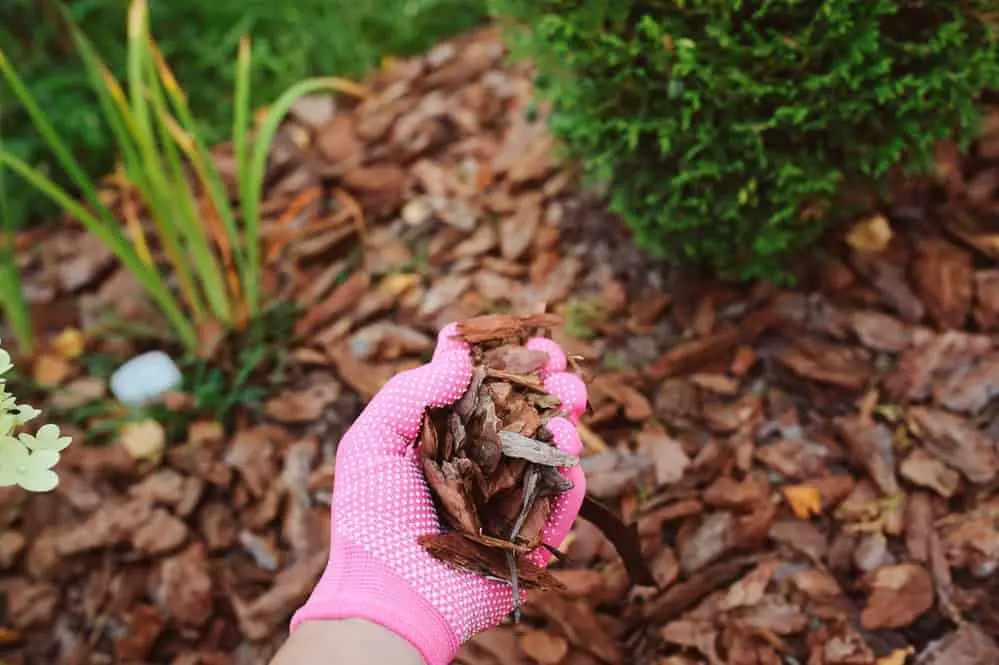
Another major drawback is its ability to repel insects, which includes pollinators too. A lack of pollination is not suitable when growing fruits and vegetables.
Lastly, we have talked extensively about ensuring safe inches between mulch plant stems to prevent rotting. In vegetable garden beds, that can be a tedious task. Therefore, for vegetable gardens, it is prudent to use cheaper alternatives like dry leaves and straw.
Cedar Mulch: Pros And Cons
While discussing the uses of cedar mulch, we touched upon many pros and cons. To fully understand the advantages and drawbacks of using a mulch like cedar in your garden, we need to take a detailed look at why it is suitable in certain situations and why you should avoid it in others.
Pros Of Using Cedar Mulch
Several unique qualities make cedar mulch a popular choice for home gardeners.
- Long-Lasting Results With Minimal Maintenance
One word: endurance. With cedar mulch, you can install it once in your garden and then forget about it for years. Its longevity is one of the prominent factors making it much more desirable than other organic contemporaries.
- Provides Protection Against Insects
Another advantage of cedar mulch, apart from its mulching benefits, is that insects hate the signature cedar aroma. This keeps your garden bug-free and helps lower the cost of insecticides.
- Adds Decorative Value To The Garden
It has great aesthetic value, even when used in its natural color. The reddish-brown hue of natural cedar chips works great in decorative gardens and pathways where it adds a beautiful contrast to the green trees.
- Helps Soil Retain Moisture
It helps retain moisture in the soil by adding a protective cover, which is a presenting quality in any mulch. The cedar mulch helps decrease evaporation. This lets you water your garden less frequently without compromising on healthy plant growth.
This also helps work against soil erosion usually caused by water or wind.
- Helps Regulate Soil Temperature
A massive advantage of using cedar mulch is its ability to regulate the temperature of the soil. In simple words, it stops the heat from escaping from the soil in winter and keeps it relatively cool in summer as an insulator.
This provides a more consistent yearly environment for your plants.
- Attracts Earthworms For Healthier Soil
Organic cedar mulch will attract earthworms and allow them to make a home in your garden soil. Why is this good for your yard? Well, simply because earthworms aerate the soil, allowing thorough mixing of organic matter.
Earthworms result in enhanced soil quality and a better soil structure.
Cons Of Using Cedar Mulch
There are many advantages of cedar mulch, some of which are typical for most mulches, while others are unique. Yet, many characteristics of this mulch limit its use.
- Not Very Pocket-Friendly
With many cheaper alternatives available in the market, paying 2 to 3 times more for cedar mulch is a massive drawback.
If you are facing a pest infestation, then using this mulch will decrease pest control costs, but you may still think of going with other budget-friendly hardwood mulch options.
- Repels Pollinators
Even though the bug-repellent quality of cedar mulch makes it extremely popular, it also works against it in a big way. When the mulch repels insects, it does not differentiate between harmful and beneficial bugs.
Therefore, with cedar mulch, you could very well be repelling pollinators that allow better fertilization and fruit production.
- Not Suitable If You Have Fragrance Allergies
Cedar mulch has a very distinct smell and, to be fair, most people enjoy it. However, if you have family members or frequent visitors with fragrance allergies, the aroma might cause them to have allergic reactions.
Therefore, in case of fragrance allergies, it is better to avoid a strong-smelling mulch. Cedar mulch can potentially cause watery eyes, sneezing and skin irritation.
- Can Cause Soil To Become Acidic
Usually, fresh cedar mulch releases a negligible amount of acid into your soil. The effect of this is barely noticeable, with one exception. If you already have acidic soil, even the minute deposited amounts could potentially pose a problem.
Therefore, it is better not to use cedar mulch in the case of acidic soil. If you still want to go ahead and use the mulch, you will have to allow it a couple of years to compost or add lime to fix the pH.
- Can Cause Nitrogen Depletion In The Soil
As with all woody plants, cedar mulch draws nitrogen from the soil to aid decomposition. Depleted nitrogen levels can hinder the optimal growth of other plants. This can become an issue in vegetable gardens where you eventually till the mulch into the soil. Tilling will allow the mulch to reach the roots, which will impact plant growth.
A safer option would be to use cedar mulch in an area where it stays on the surface instead of in the soil.
Moreover, if you were to use cedar mulch in vegetable beds, you can mix extra nitrogen into the soil to fight the low levels.
Final Thoughts
With benefits like soil insulation and moisture retention, cedar mulch has cemented its place as one of the best mulches for home gardeners. It lasts long and helps deal with garden bugs while saving money on pest control.
That being said, it is not the best choice in all situations. It is expensive, repels pollinators and slowly strips the soil of nitrogen when tilled.
All in all, the advantages and drawbacks of cedar mulch are subjective to its use. Where you live and what garden kind you have will allow you to weigh the pros and cons differently. However, it is best to use in decorative and aesthetically pleasing garden areas.
